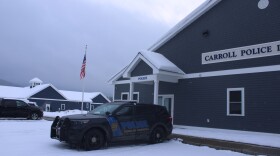Activists gathered in the sanctuary at St. Paul's Episcopal Church in Concord on Tuesday to announce their intention to respond to the uptick in immigration enforcement under the Trump Administration.
They’ve named the effort "sanctuary communities," and they say the idea is less formal than a municipal government decision. Instead, it’s a group of a dozen or so residents in a region who declare that they will do their best to help immigrants who may be targeted by U.S. Immigration and Customs Enforcement officers.
“We will do whatever is necessary, legal and moral, to protect ourselves and fellow residents of New Hampshire,” said Manchester resident and activist Philip Kaifer. “We will surveil ICE raids. We will record them. We will report them to state and national media, as well as to local law enforcement and to the institutions in our communities.”
So far, individuals have declared eight regional sanctuary communities across New Hampshire, and activists say they are fielding questions from people in other states that are interested in starting their own.
The term “sanctuary” is politically loaded. It is often used by Republicans to describe municipalities that have adopted ordinances that say they welcome immigrants in their communities, or have adopted so-called "fair and impartial: policing policies. Since January, both state and federal governments have been making efforts to crack down on the places they call “sanctuary jurisdictions,” places where local law enforcement will not cooperate with ICE on immigration matters.
The state Legislature passed two new laws in May that require police and local officials to cooperate with ICE, one even originally called a “sanctuary ban.” Shortly after, the U.S. Department of Homeland Security added Hanover and Lebanon to a list of “sanctuary jurisdictions defying federal immigration law” and demanded that they change municipal policies. Both communities have since been removed from the list, but are changing their policies to align with state law.

But now, activists like Maggie Fogarty are trying to reclaim the word “sanctuary” and the concept behind it.
“The word sanctuary is a sacred word. It is about safety — it is about love and courage and speaking the truth of our faith or our beliefs,” she said. “The state is passing laws in an attempt to prohibit exactly what people need to be doing right now, so we proudly reclaimed the word for all of its sacred meanings.”
The Tuesday gathering drew criticism from state Republicans, including Gov. Kelly Ayotte, who has expressed support for the deportation of people she calls “dangerous criminals” since she was elected.
“Threats to law enforcement or efforts to obstruct them will not be tolerated in New Hampshire. We are not a sanctuary for criminals who have come into this country illegally, and the law I signed earlier this year reinforces that. If you disrupt law enforcement activity, you will be prosecuted,” she said in a statement Tuesday. “We will enforce our laws and cooperate with federal law enforcement to keep dangerous criminals out of our communities.”









